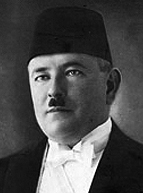Mehmed Spaho
| Mehmed Spaho | |
|---|---|
 |
|
| Minister of Trade and Industry of the Kingdom of Yugoslavia | |
|
In office 26 March 1921 – 1 June 1921 |
|
| Minister of Forestry and Mining of the Kingdom of Yugoslavia | |
|
In office 22 December 1918 – 23 February 1919 |
|
| Personal details | |
| Born |
13 March 1883 Sarajevo, Austrian-occupied Bosnia and Herzegovina, de jure Ottoman Empire |
| Died | 29 June 1939 (aged 56) Belgrade, Kingdom of Yugoslavia |
| Spouse(s) | Habiba |
| Alma mater | University of Vienna |
| Religion | Sunni Islam |
| Awards | Order of Franz Joseph (Knight Cross) |
Mehmed Spaho (13 March 1883 – 29 June 1939) was a Bosnian politician and leader of the Yugoslav Muslim Organization. He was the first Bosnian Muslim politician in the Kingdom of Serbs, Croats and Slovenes. Spaho was described as the "undisputed leader of the Bosniaks between the two world wars" by the newspaper Oslobođenje in 2013. He died under mysterious circumstances in a Belgrade hotel.
Spaho was born in Sarajevo to a coppersmith family. His father Hasan was an expert of the Sharia law, and before the Austrian-Hungarian occupation, he was a judge in Jajce, Sofia, Damascus and Cairo. His mother was Fatima (née Bičakčić). Spaho had also three sisters, Behija, Aiša and Habiba, and two brothers, Fehim and Mustafa.
Spaho attended elementary school in Sarajevo, where he was a good student. In 1906 graduated from the Faculty of Law at the University of Vienna. At the end of 1907 he passed the doctoral exam and on 7 February 1908, he was officially named dr. iur. In Vienna, Spaho was a member of an organization called "Zvijezda" (The Star), an organization that gathered Muslim students. This organization promoted a closer cooperation between Serbs and Bosnian Muslims. Pro-Croat oriented Hakija Hadžić claimed that he challenged Spaho to a duel, while both of them were in Vienna, but Spaho refused to appear.
When he returned from Vienna in 1906, Spaho worked as a court clerk until 1908. In 1910 he became a lawyer clerk for Josef Fischer. When the Commercial Chamber was established in Sarajevo in 1910, on its session held on 11 November 1910, Spaho was elected to be its secretary with an annual payment of 6,000 kronas; he started to work on 1 January 1911. During that time, he had an ambition to enter the Diet of Bosnia, along with other group of Muslims educated outside Bosnia and Herzegovina. His group eventually failed to enter the Diet. In 1914, Spaho was elected to Sarajevo City Council, after his political associate and friend, Esad Kulović, stepped down. By this, Spaho dealt with both, economics and politics.
...
Wikipedia
